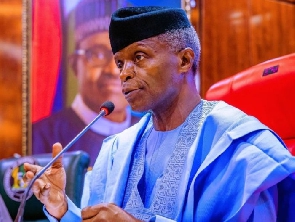The Code of Conduct Bureau has explained that the Act that established it does not permit it to make public the assets declared by public officials. It however noted that officials could on their own make their forms public.
The explanation came as the President, Major General Muhammadu Buhari (retd.); his deputy, Prof Yemi Osinbajo; and other public officials prepare to declare their assets preparatory to leaving office in compliance with the requirements of the law.
A senior official of the CCB, Veronica Kato, said in an interview with Saturday PUNCH that the bureau could only make such documents available by a court order in a case where a public official was under investigation or trial for alleged corruption relating to the acquired assets.
Kato said, “It is not possible to make the assets declared to the CCB by these public officials public. There is a law guiding the CCB and that law does not allow us to do so. This is due to the conditions upon which the assets declaration is constituted according to the guidelines.
“The assets declaration form is to be given to the public officials on terms and conditions as prescribed by the National Assembly, and those terms and conditions, up till now, do not permit us to make it available to the public. Besides, it is a private document and it’s confidential.”
Kato noted that while journalists might want to have access to such information, it was beyond the CCB to make such information public due to the breach of the owner’s confidential details.
She added, “It’s a different case where there’s a petition or something of that sort demanding that a particular official’s declared assets should be made available for investigation purposes. If a public official decides on their own volition to make it public, such a person will do that. We have been established for over 25 years and we don’t make declared assets’ details public because we don’t have the power to do that.”
“For example, when the incumbent President and his deputy came into office, they decided to declare their assets publicly. That was their decision. They are also the only ones that can decide to make the assets public as they are leaving.
“Our duty is to ensure that public officials declare their assets to the CCB; we take custody of the asset declaration forms and we verify those assets, and when we see red flags, we investigate and prosecute them if we find contravention against the code of conduct rule. Those are our primary functions.”
When asked how the citizens could assist the CCB when they do not know the assets listed in the forms, Kato said if any citizen felt a public official had acquired more than they had before getting into office “and the citizen can provide evidence to proof that such assets were acquired with illicit funds and through the abuse of their office, the citizen can write a petition to the CCB and we will investigate and compare what they declared with what they now have.”
Kato added, “If we can establish beyond reasonable doubt that these things were acquired illicitly, then we go to court.”
Prior to the 2015 general election, Buhari promised he would publicly declare his assets and liabilities if voted into power.
In a document titled, ‘I pledge to Nigeria’, Buhari highlighted what he would do in his first 100 days if he assumed power on May 29, 2015. He said he would encourage political appointees in his administration to also declare their assets publicly.
He had said, “I pledge to publicly declare my assets and liabilities and encourage all my appointees to publicly declare their assets and liabilities as a pre-condition for appointment. All political appointees will only earn the salaries and allowances determined by the RMFAC.”
After much criticism of his refusal to keep to his promise after he was sworn in, in September 2015, the Presidency eventually published Buhari and Osinbajo’s assets.
Details of Buhari’s declared assets were made public in a statement by his spokesman, Garba Shehu, showing that the assets were valued at less than N30m at the time of his inauguration on May 29.
Shehu added that the President’s money was held in a single local bank account. Buhari was said to have homes in Daura in addition to an orchard with a number of economic trees and a ranch with 270 heads of cattle, 25 sheep and five horses, as well as shares in Berger Paints, Union Bank and Skye Bank (now Polaris Bank).
Osinbajo, on his part, declared N94m and $900,000 held in his bank accounts. He also declared a four-bedroom residence in Lagos, a three-bedroom flat in Ikoyi and another two-bedroom apartment at the Redemption Camp along the Lagos-Ibadan Expressway.
The Vice-President also listed a mortgaged property with two bedrooms in Bedford, England.
Shehu added, “Apart from his law firm, known as SimmonsCooper Partners, the Vice-President also declared shareholding in six private companies based in Lagos, including Octogenerium Limited, Windsor Grant Limited, Tarapolsa, Vistorion Limited, Aviva Limited and MTN Nigeria.
“His personal vehicles are one Infinity four-wheel drive SUV, one Mercedes Benz and a Prado SUV.”
In May 2019, before his inauguration for a second term, Buhari submitted a second set of assets declaration forms to the CCB. It was stated that the declaration showed no significant changes in assets as declared by him in 2015.
“There are no new houses, no new bank accounts at home and abroad, and there are no new shares acquired,” he said.
General News of Saturday, 22 April 2023
Source: punchng.com













